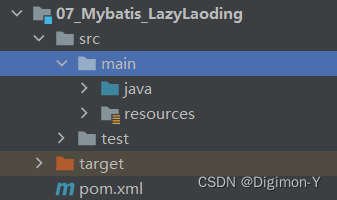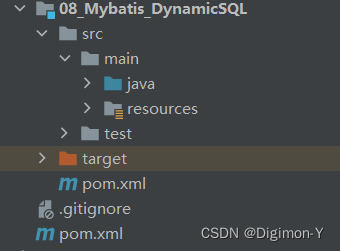8.MyBatis的关联查询
8.3.一对多查询
需求:查询所有用户信息及用户关联的账户信息。
分析:用户信息和他的账户信息为一对多关系,并且查询过程中如果用户没有账户信息,此时也要将用户信息查询出来,此时左外连接查询比较合适。
8.3.1.pojo
package com.by.pojo;import java.io.Serializable;
import java.util.Date;
import java.util.List;public class User implements Serializable {private Integer id;private String username;private Date birthday;private String sex;private String address;private List<Account> account;@Overridepublic String toString() {return "User{" +"id=" + id +", username='" + username + '\'' +", birthday=" + birthday +", sex='" + sex + '\'' +", address='" + address + '\'' +", account=" + account +'}';}public List<Account> getAccount() {return account;}public void setAccount(List<Account> account) {this.account = account;}public Integer getId() {return id;}public void setId(Integer id) {this.id = id;}public String getUsername() {return username;}public void setUsername(String username) {this.username = username;}public Date getBirthday() {return birthday;}public void setBirthday(Date birthday) {this.birthday = birthday;}public String getSex() {return sex;}public void setSex(String sex) {this.sex = sex;}public String getAddress() {return address;}public void setAddress(String address) {this.address = address;}}8.3.2.mapper
package com.by.dao;import com.by.pojo.User;import java.util.List;public interface UserDao {User getUserById(Integer id);
}
<?xml version="1.0" encoding="UTF-8"?>
<!DOCTYPE mapperPUBLIC "-//mybatis.org//DTD Mapper 3.0//EN""http://mybatis.org/dtd/mybatis-3-mapper.dtd">
<resultMap id="getUserByIdResultMap" type="user"><id column="id" property="id"></id><result column="username" property="username"></result><result column="birthday" property="birthday"></result><result column="sex" property="sex"></result><result column="address" property="address"></result><!--一对多使用collection标签指定数据的封装规则--><collection property="account" ofType="account"><id column="aid" property="id"></id><result column="uid" property="uid"></result><result column="money" property="money"></result></collection></resultMap><select id="getUserById" parameterType="int" resultMap="getUserByIdResultMap">SELECTu.*,a.id aid,a.money money,a.uid uidFROMuser uLEFT JOINaccount aONu.id=a.uidWHEREu.id=#{id}</select>
8.3.3.测试
/*** 一对多:一个user 对 多个Account*/@Testpublic void testGetUsertById() throws IOException {UserDao userDao = sqlSession.getMapper(UserDao.class);User user = userDao.getUserById(41);System.out.println(user);}8.4.多对多查询
需求:查询角色及角色赋予的用户信息。
分析:一个用户可以拥有多个角色,一个角色也可以赋予多个用户,用户和角色为双向的一对多关系,多对多关系其实我们看成是双向的一对多关系。

user(uid, username):王贺、万通
user_role(uid, rid)
role(rid, ):校长、老师、学生
8.3.1.pojo
package com.by.pojo;import java.util.List;
// 一方
public class Role {private Integer id;private String roleName;private String roleDesc;// 多方private List<User> user;@Overridepublic String toString() {return "Role{" +"id=" + id +", roleName='" + roleName + '\'' +", roleDesc='" + roleDesc + '\'' +", user=" + user +'}';}public Integer getId() {return id;}public void setId(Integer id) {this.id = id;}public String getRoleName() {return roleName;}public void setRoleName(String roleName) {this.roleName = roleName;}public String getRoleDesc() {return roleDesc;}public void setRoleDesc(String roleDesc) {this.roleDesc = roleDesc;}public List<User> getUser() {return user;}public void setUser(List<User> user) {this.user = user;}
}8.3.2.mapper
package com.by.dao;import com.by.pojo.Role;public interface RoleMapper {Role getRoleById(Integer id);
}<?xml version="1.0" encoding="UTF-8"?>
<!DOCTYPE mapperPUBLIC "-//mybatis.org//DTD Mapper 3.0//EN""http://mybatis.org/dtd/mybatis-3-mapper.dtd">
<mapper namespace="com.by.dao.RoleMapper"><resultMap id="getRoleByIdResultMap" type="role"><id column="rid" property="id"></id><result column="role_name" property="roleName"></result><result column="role_desc" property="roleDesc"></result><!--一对多使用collection标签指定数据的封装规则property="userList":pojo的属性ofType="com.by.pojo.User":集合的泛型,等价于resultType--><collection property="user" ofType="user"><id column="id" property="id"></id><result column="username" property="username"></result><result column="birthday" property="birthday"></result><result column="sex" property="sex"></result><result column="address" property="address"></result></collection></resultMap><select id="getRoleById" parameterType="int" resultMap="getRoleByIdResultMap">SELECTr.id rid,role_name,role_desc,u.*FROMuser_role urLEFT JOINrole rONur.rid=r.idLEFT JOINuser uONur.uid=u.idWHEREr.id=#{id}</select>
</mapper>
8.3.3.测试
/*** 多对多:一个user 对 多个role 一个role 对 多个user*/@Testpublic void testGetRoletById() throws IOException {RoleMapper roleMapper = sqlSession.getMapper(RoleMapper.class);Role role = roleMapper.getRoleById(1);System.out.println(role);}
9.MyBatis的延迟加载
创建工程:

9.1.什么是延迟加载?
开启延迟加载后,在真正使用数据的时候才发起级联查询,不用的时候不查询。
9.2.mapper
package com.by.dao;import com.by.pojo.User;import java.util.List;public interface UserDao {User getUserById2(Integer id);
}<?xml version="1.0" encoding="UTF-8"?>
<!DOCTYPE mapperPUBLIC "-//mybatis.org//DTD Mapper 3.0//EN""http://mybatis.org/dtd/mybatis-3-mapper.dtd">
<mapper namespace="com.by.dao.UserDao"><!--id:和接口方法名保持一致resultType:和接口返回类型保持一致--><select id="findAll" resultType="com.by.pojo.User">select * from user</select><select id="getUserById" parameterType="int" resultType="user">select * from user where id=#{id}</select><resultMap id="getUserById2ResultMap" type="user"><id column="id" property="id"></id><result column="username" property="username"></result><result column="birthday" property="birthday"></result><result column="sex" property="sex"></result><result column="address" property="address"></result><!--property="accountList":pojo的属性ofType="account":集合的泛型select="com.by.mapper.AccountMapper.selectAccountByUid":要调用的select标签的idcolumn="id":传递的参数fetchType="lazy":局部开启延迟加载--><collection property="accountList" ofType="account" select="com.by.dao.AccountMapper.selectAccountById" column="id" fetchType="lazy"></collection></resultMap><select id="getUserById2" parameterType="int" resultMap="getUserById2ResultMap">SELECT * FROM user WHERE id=#{id}</select>
</mapper>
9.3.全局开启懒加载
<!-- 全局配置延迟加载策略 --><settings><!-- 打开延迟加载的开关 --><setting name="lazyLoadingEnabled" value="true"/></settings>
9.4.测试
@Testpublic void testGetUserById2() throws IOException {UserDao userDao = sqlSession.getMapper(UserDao.class);User user = userDao.getUserById2(41);System.out.println(user.getUsername());List<Account> accountList = user.getAccountList();for (Account account : accountList) {System.out.println(account);}}
10.MyBatis的动态SQL
创建工程:

10.1.什么是动态SQL?
MyBatis的映射文件中支持在基础SQL上添加一些逻辑操作,并动态拼接成完整的SQL之后再执行,以达到SQL复用、简化编程的效果。
10.2.if标签
我们根据实体类的不同取值,使用不同的SQL语句来进行查询。比如在id如果不为空时可以根据 id查询,如果username不同空时还要加入用户名作为条件。这种情况在我们的多条件组合查询中经常会碰到。
mapper接口
package com.by.dao;import com.by.pojo.User;import java.util.List;public interface UserDao {User findAll2(User user);
}mapper映射文件
<?xml version="1.0" encoding="UTF-8"?>
<!DOCTYPE mapperPUBLIC "-//mybatis.org//DTD Mapper 3.0//EN""http://mybatis.org/dtd/mybatis-3-mapper.dtd"><select id="findAll2" parameterType="user" resultType="user">SELECT * FROM user<where><if test="id != null">AND id=#{id}</if><if test="sex != null and sex != ''">AND sex=#{sex}</if></where></select>测试
public void testFindAll2(){UserDao userDao = sqlSession.getMapper(UserDao.class);User user = new User();user.setId(41);user.setSex("男");System.out.println(userDao.findAll2(user));}
10.3.where标签
为了简化上面where 1=1的条件拼装,我们可以使用where标签将if标签代码块包起来,将1=1条件去掉。
若查询条件的开头为 “AND” 或 “OR”,where 标签会将它们去除。
mapper映射文件
<?xml version="1.0" encoding="UTF-8"?>
<!DOCTYPE mapperPUBLIC "-//mybatis.org//DTD Mapper 3.0//EN""http://mybatis.org/dtd/mybatis-3-mapper.dtd">
<!--namespace:隔离sql,一般是接口名称的全类名-->
<mapper namespace="com.by.dao.UserDao">
<select id="findByUser" resultType="User">select * from user<!--where标签将if标签代码块包起来去掉开头 “AND” 或 “OR”--><where><if test="username!=null and username != ''">and username=#{username}</if><if test="birthday!=null">and birthday=#{birthday}</if><if test="sex!=null and sex != ''">and sex=#{sex}</if><if test="address!=null and address != ''">and address=#{address}</if></where></select></mapper>
10.4.set标签
set标签用于动态包含需要更新的列,并会删掉额外的逗号
mapper
package com.by.dao;import com.by.pojo.User;import java.util.List;public interface UserDao {void updateUserById(User user);
} <update id="updateUserById" parameterType="user">UPDATE user<set><if test="username != null and username != ''">username=#{username},</if></set>WHERE id=#{id}</update>
测试
@Testpublic void testUpdateUserById(){UserDao userDao = sqlSession.getMapper(UserDao.class);User user = new User();user.setId(41);user.setUsername("杨过");userDao.updateUserById(user);}





![P1308 [NOIP2011 普及组] 统计单词数](http://pic.xiahunao.cn/P1308 [NOIP2011 普及组] 统计单词数)







| 使用Neo4j和LlamaIndex实现多模态RAG)
![[node]Node.js 模块系统](http://pic.xiahunao.cn/[node]Node.js 模块系统)

使用paddlepaddle,再探波士顿房价预测)


